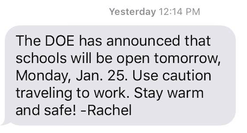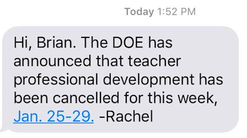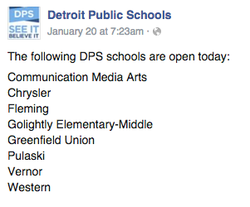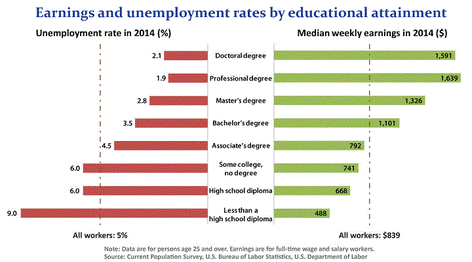It seems strange that if some teachers cannot get to school that a) the rest of us are expected to, and b) that the 100 minutes we get after school would be equivalent to the day these teachers did not have to use from their sick/personal leave. Weird, huh?
|
Over the past 24 hours I have received two text messages from the UFT on behalf of the Department of Education. The first, came yesterday at 12:14pm: Even though schools in Philadelphia, DC, and Baltimore got days off school for a similar amount of snow, residents of NYC had to shlep their kids to school (or send them on subways that may or may not be working). Teachers all across the city had to leave earlier or circle their schools for 45 minutes looking for parking (like my co-teacher did this morning). Then, out of the blue, we received this information in the afternoon today: According to a few colleagues, apparently the teachers who worked in far east New York City (past the 7 train) were unable to get to work due to challenges with the Long Island Railroad and plowing past the city limits. Therefore, some schools were closed today due to lack of educators being able to come to their buildings. Then, even though it was not truly equitable per se, the rest of teachers in the city receive a "give back" of PD time that we don't have to go to.
It seems strange that if some teachers cannot get to school that a) the rest of us are expected to, and b) that the 100 minutes we get after school would be equivalent to the day these teachers did not have to use from their sick/personal leave. Weird, huh?
0 Comments
 If you scroll down to the bottom of this article in the Detroit Free Press, you can see images (like the one to the right) of the despicable conditions that adults and children are forced to endure across their school system. Broken windows, moldy ceilings, uneven floors, and more issues plague their buildings. While my current school in New York City does not have these same issues, I empathize with the situation in Detroit form my days working in older and less maintained buildings in Philadelphia that had similar conditions, It is for this reason (as well as protests of large class sizes and other issues) that Detroit Public School teachers have been protesting using a means at their disposal: the "sick out." Groups of teachers across the city have been staying at home instead of working in deplorable conditions in order to get more attention to the issues at hand. This past week, the DPS has gone to Facebook to announce the schools that are open because it is a much shorter list than those that are closed. Even though the DPS has gone to court to ask for an injunction against the sickouts, the judge ruled in favor of the union and its teachers. Some groups are calling for a more extended teacher strike in the near future. Whatever happens, I hope that more attention is paid to whom is running the school district and they supply more support in order to fix the physical and emotional problems plaguing it.
ChalkBeat recently reported that the graduation rate for students of New York City has reached 70% for the first time. As these kinds of increases have been political goals for mayor and governors alike, it is obviously treated as an achievement of greatness. On the other hand, what exactly does a diploma represent these days? I have worked in five different public schools over my eight years of being in classrooms and seen some very shady things happen in order to make sure students are graduating. I have also seen such pressure on teachers to make sure their students earn enough credits otherwise their evaluation scores would be reduced significantly. So, it begs the question, What is a diploma really worth these days? Having a high school diploma does not guarantee success in life. If you look at this chart from the Bureau of Labor Statistics, individual will overtake the average salary once they complete a bachelor's degree in college. So, one of the most important things to do is make sure our high school graduates are equipped to stay in the college classroom until college graduation. Unfortunately, this is not currently taking place. If you believe the statistics mentioned in this NY Times article, we have serious trouble when it comes to college completion and student retention. The most recent evaluation of 12th graders on a national test of reading and math found that fewer than 40 percent were ready for college level work. College remediation and dropout rates remain stubbornly high, particularly at two-year institutions, where fewer than a third who enroll complete a degree even within three years. We need to make sure our students are prepared not only with credits but also with the know-how to navigate college systems as well as the determination to make it through the rigorous process of learning more individually than ever before.
Last Monday, the NY State Board of Regents looked various proposals to to allow more project-based assessments to earn a diploma instead of the Regents Exam itself. This might be a good way to give students more individual accountability with more rigor. They also looked a proposal to allow students to appeal their Regents score if it is between 60-64% (the current appeal level is 62-64%). I'm not sure what the right solution is on the state level but I do know that at my school we focus a lot on preparing students to be accountable for themselves, to self-advocate, and be ready for unexpected challenges that lie ahead. We have a college retention rate somewhere in the 80%s after 3 semesters in college - something most schools cannot boast. I hope I learn what is really going on at a school-wide level sometime so I can share that information with others. It's only with methods like this can be make sure diplomas mean something and our students are really prepared for college. The New York Times recently published an article on the increase in graduation rates across the United States but the lack of college readiness by those same students. As a teacher who has seen firsthand what this can mean in five different schools (four in Philadelphia and one in Brooklyn) even the best schools I've experienced are plagued by this issue. There is such an emphasis that test scores and graduation rates increase despite the increasing demand of higher standards that mathematically there would have to be some drop in graduation rates - at least in the short term - to balance that demand. If you read the responses including myriad of teachers there is such corroboration by those actually in the classroom.
In my opinion, one of the worst things that can happen in a school is the idea of grade inflation, where scores and marks are given and not earned. Despite what is sometimes reported as stricter standards for programs like Credit Recovery (earning class credit for fewer seat-hours and usually less-rigorous work), there are many ways for students to earn credit without having to be in the classroom. On page 37 of this academic policy document it outlines the procedures for using "Targeted Credit Recovery" with many guidelines for use by senior students and their teachers. It requires a certain number of hours (sometimes) of work as well as delineating when this credit recovery should take place and some of the form it should take. One of the limitations that is not always obvious is a student can not earn more than 3 credits in this manner. So students who have performed at such low levels consistently will need alternate methods in order to get their diploma. We have only three more weeks in the semester before grades are due and credits are awarded. I am hopeful that I have prepared my students in such a way that they understand the grades they will be earning and do not externalize the reason for them. I will do my best to connect with students in need over the coming week to make sure they are prepared and know what is coming up. Good luck to all teachers in this final push for academic focus. |
AuthorI am a math teacher in the New York Department of Education. I infuse technology and real-world problems into my curriculum in order to prepare my students for the future. I would love for people across the country to recognize we teachers can't do it alone. If you don't believe me, come visit my classroom! Contact MeEmail UpdatesArchives
March 2022
|






 RSS Feed
RSS Feed
